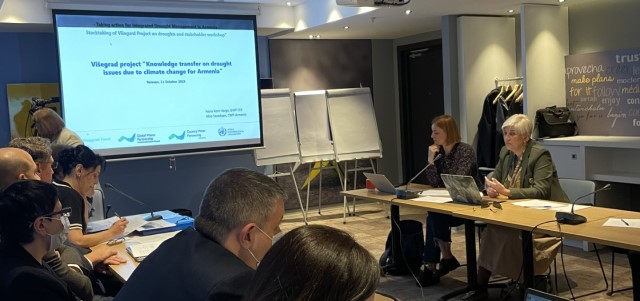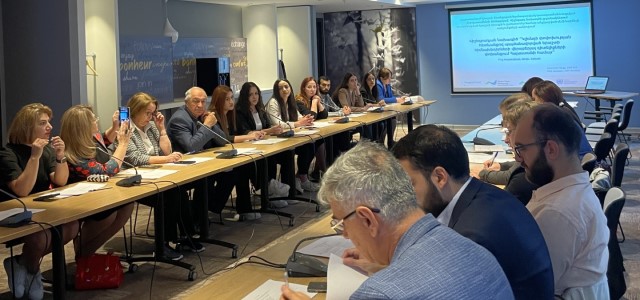The training marked one of the final activities within the framework of the Visegrad-funded project 'Knowledge transfer on drought issues due to climate change for Armenia.' It drew 45 participants with diverse expertise and responsibilities, including individuals from multiple ministries, farmers, students, hydrometeorological experts, and more. Despite their varying backgrounds, all attendees shared a strong dedication to addressing drought-related challenges, making this training an invaluable opportunity for knowledge exchange and experience sharing.
The training was conducted by renowned experts with extensive experience in global drought-related issues, namely, Dr. Robert Stefanski (Head of Applied Climate Services Division at the World Meteorological Organization) and Dr. Valentin Aich (Senior Water and Climate Specialist at the Global Water Partnership Organization). They shared their insights on the Integrated Drought Management Programme (IDMP) and the steps involved in its implementation. The IDMP supports governments and various stakeholders in managing droughts by providing policy, technical, and management guidance, and by sharing scientific expertise and best practices. The experts provided a comprehensive overview of the three key pillars of the IDMP: Pillar 1. focusing on Monitoring and Early Warning, Pillar 2. addressing Vulnerability and Impact Assessment, and Pillar 3. concentrating on Drought Risk Mitigation, Preparedness, and Response.

Following the general overview, the experts delved into more specific details and discussed the status of IDMP implementation in Visegrad countries, including Poland, Czech Republic, Slovakia, and Hungary. Armenian stakeholders expressed significant concerns about drought issues in their mountainous country, characterized by arid climate conditions. The entire territory and vulnerable ecosystems are considered highly sensitive to climate change. Recent years have witnessed a noticeable increase in the frequency and intensity of extreme weather events, such as droughts, heatwaves, frost, hail, strong winds, and precipitation. Natural disasters, such as floods, inundations, forest fires, and more, have also become more prevalent. These changes have had negative impacts on ecosystems, the economy, human welfare, and public health, as highlighted in Armenia's Fourth National Communication on Climate Change (2020).

On the first day of the training, participants received intensive education about the IDMP and learned about how various countries, both globally and within the Visegrad region, have adapted the program to their specific drought-related challenges. During the World Café session, participants had the opportunity to share their own insights on addressing the gaps identified in the 'Integrated Drought Management in Armenia Gap Analysis,' a report prepared in a previous project funded by NOAA (National Oceanic and Atmospheric Administration).
The second day of the training focused on engaging youth. Students from various faculties visited a hydrometeorological station near Yerevan, where experts from the Hydro-meteorology and Monitoring Center presented practical examples of agricultural drought management. The training empowered participants to learn from Visegrad countries, enhancing their understanding of how to effectively implement the IDMP in Armenia."
